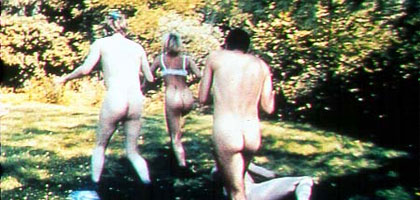
Burn, baby, burn
Film of the Month: Idiots

Lars von Trier's self-consciously amateur experiment The Idiots has spasms of genius, but its playful, inner-child message and too-tidy ending trouble Xan Books
The second film to be released under the Dogma 95 code of conduct, The Idiots is a curious and haphazard creature, more daring thematically than Thomas Vinterberg's gripping but essentially conventional Festen, yet more wild and woolly too. From its opening title (rendered as chalk marks on a parquet floor), this essay in social deviance positively wallows in semi-contrived amateurism. Writer-director Lars von Trier has stated that the principal purpose of both Dogma and The Idiots is to allow film-makers to relinquish artistic control, and make a push towards an ideal dramatic state that's closer to camcorder voyeurism than to the sanitised gloss of mainstream cinema. So The Idiots breaks away from the formal precision its creator showed in his previous feature, Breaking the Waves, and adopts a guerrilla aesthetic. Von Trier's baby jives to a rhythm of jump cuts, using ill-focused camera movements (handheld, naturally) and scene changes that arrive abruptly, unheralded by audience-friendly establishing shots. At one point a boom microphone's shadow chases the characters up a sunlit gravel drive. Fluffed lines and technical gaffes are proudly flaunted. The whole thing runs on a kind of whoops!-accidentalism.
All of which would surely turn The Idiots into the cinematic equivalent of ready-ripped jeans were it not for the fact that the film's form fits so snugly with its content. The picture's opening half views like nothing so much as a dramatic (and X-rated) extension of such downmarket, fly-on-the-wall television shows as Candid Camera and Beadle's About. It functions like a controlled social experiment, a hard-and-fast study in behavioural science. The opening scenes find von Trier's group of middle-class youngsters running amok through straight society, "spassing" or playing the "idiot" to tease, test and bait the 'normal' people they encounter. They gorge themselves on a free meal at a chichi restaurant, disturbing their fellow diners in the process. They are ushered around an insulation plant by an accommodating factory foreman. At a busy local swimming pool, the vixenish Nana (Trine Michelsen) bares her breasts, and ringleader Stoffer (Jens Albinus) sprouts an erection in the communal showers. Unsettled by these antics, new recruit Karen (Bodil Jørgensen) initially views them as cruel student japes, a way of getting at people. "You poke fun," she comments disapprovingly.
Throughout its second half, however, The Idiots grows more layered and contemplative. The dubious shenanigans of its opening minutes become the raw data for a wider thesis. While the simple thrill of transgression seems to be the appeal for many of the idiots (Nana in particular), others prefer to regard themselves as a band of renegade anthropologists striving for a new Utopia. Pocket-demagogue Stoffer contends that, "idiots are the people of the future," and claims that the point of his experiment is the "search for the inner idiot". In this way, the characters' embrace of idiocy is portrayed as a blend of druggy transcendence and primal-scream therapy. The previously sceptical Karen reverts to murmuring infancy in a swimming-pool sequence that's shot to look like a new dad's video recording of a water birth. Later Josephine (Louise Mieritz) and Jeppe's (Nikolaj Lie Kaas) spass love-making shifts imperceptibly from play-acting into a fumbling real-life union. (Josephine's subsequent removal from the group - by her father who claims, "she is seriously ill" - further blurs the lines between phoney mental instability and the real McCoy.)
The trouble is that in following this dictate through to its logical conclusions, von Trier pilots his film into a tricky cul-de-sac. On its most basic level, The Idiots pushes a message that idiocy equals the inner-child; that real mentally-handicapped people represent an unsullied human essence, people who operate at the business end of their emotions: who love, fight, fuck and eat without regard for social etiquette. Dramatically, this is fraught with problems. On the one hand, it risks sentimentalising the mentally impaired, conjuring them into generic emblems of saintliness. This, incidentally, looks to be a recurring pitfall for von Trier. Breaking the Waves employed Emily Watson's guileless heroine as a sacrificial lamb, while his generally masterful serial The Kingdom suffered from the use of a Down's syndrome couple as a visionary Greek chorus within the narrative.
More crucially, The Idiots' inner-child message is a banal and well-worn one. Within US cinema, in particular, it has run down the years as a more sugary variation on the Rebel without a Cause (1955) template. In modern times it has found its perfect expression in the oeuvres of Jim Carrey and Robin Williams, two actors who have carved a profitable niche playing wild and wacky buckers of convention. Frustratingly, The Idiots' final scenes reveal von Trier at his most conservative. The genuinely unstable Josephine finds spiritual balm from play-acting the idiot (before being torn away by her authority-figure dad). The broken and tragic Karen exorcises the ghosts of her past by spassing during a tense encounter with her estranged family. While never vacuous or feel-good, this closing segment annoyingly attempts to tie The Idiots' diffuse and colourful threads into a uniform little bow. But as a nominal embrace of chaos, this is - ironically - too neat, too secure. It undoes a lot of the raw-cored disorder which came before.
Ultimately, The Idiots emerges as a truly fascinating folly, an all-but-impenetrable muddle with glimmers of genius running from top to tail. Von Trier claims he wrote it at speed (four days) and shot it at a sprint in order to pin down that butterfly spirit of improvisation, of tumult, that is Dogma 95's lifeblood. This undeniably results in a film of crazy-paved surfaces and deep puddles of ambiguity. But what it also does is offer an X-ray of its creator's ideals and aesthetic. Von Trier sets up his laboratory, ignites his chemicals and watches them burn. But try as he might to distance himself from his experiment, there remains a strict methodology to his madness: man's moral code is unbreakable, it hungers for dramatic resolution, reasserting itself at the finish. The result is less a filmic revolution than an Aesop's fable for anarchists. In its dying moments, The Idiots cleans off the cum and transgresses to a purpose. It all ends tidily.
